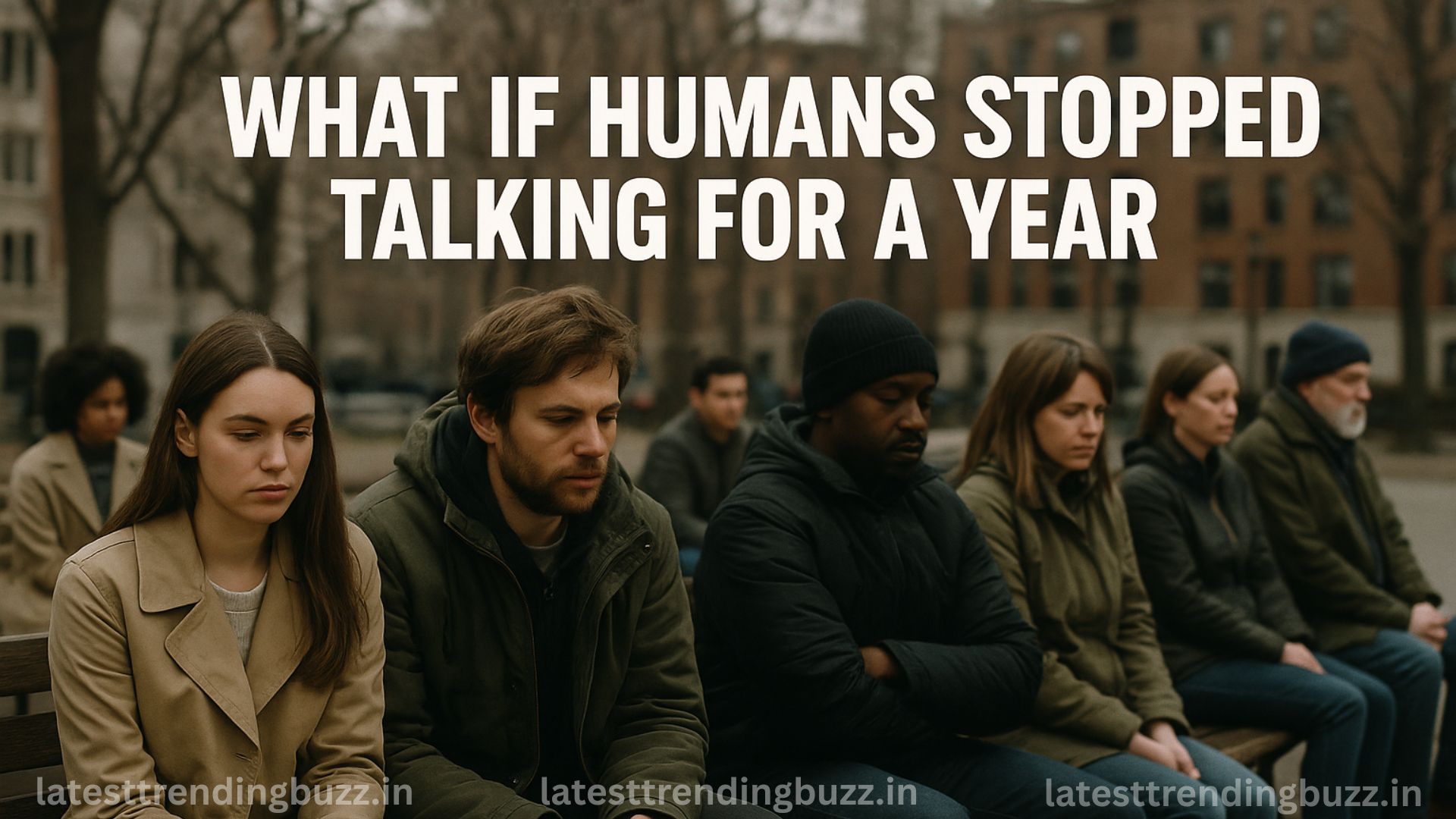Imagine waking up tomorrow — and no one speaks.
No words, no sentences, no sound.
Just gestures, eyes, and silence.
What If Humans Stopped Talking for a Year?
Would we collapse into chaos — or evolve into something extraordinary?
The experiment isn’t just about losing language; it’s about discovering what replaces it.
Because silence isn’t the absence of communication — it’s the beginning of a new kind.
The Science of Silence
Speech is humanity’s defining feature, but it’s also a relatively new evolutionary tool.
For over 90% of human history, our ancestors didn’t have complex spoken language — they relied on gestures, facial expressions, and emotional resonance.
So, What If Humans Stopped Talking for a Year today?
We might not regress — we might remember.
How the Brain Adapts Without Speech
Neuroscience reveals that when one form of communication is removed, the brain compensates by enhancing others.
- The Visual Cortex becomes more sensitive to micro-expressions.
- Mirror Neurons heighten empathy and understanding.
- Auditory Regions start detecting emotional cues from breath, movement, and rhythm.
In short, silence doesn’t weaken us — it rewires us.
That’s the central truth of What If Humans Stopped Talking for a Year:
Our brains would evolve, not degenerate.
The First 30 Days: Cognitive Withdrawal
The initial month would be chaos.
Language addiction is real — humans process over 16,000 words a day, consciously or not.
The silence would trigger:
- Social confusion
- Emotional anxiety
- Misunderstandings in relationships
- Discomfort from the loss of noise
But then, something fascinating would happen: the rise of intuition.
In the absence of speech, humans would rediscover ancient instincts — reading emotions through micro-expressions, gestures, and even silence itself.
3–6 Months: The Rise of Nonverbal Systems
As the months progress, entire societies would begin structuring new nonverbal codes.
We’d see:
- Hand signal alphabets (like sign language 2.0)
- Facial micro-signals to represent agreement, doubt, or sarcasm
- Group synchronization — humans mirroring body language to align socially
Human connection wouldn’t vanish — it would transform.
This is the beautiful paradox of What If Humans Stopped Talking for a Year — silence would make us more attuned, not isolated.
Also Read: The Truth About Reality: How 90% of What You See Is Just Your Brain Filling Gaps
Emotional Intelligence Would Explode
Without words, emotion becomes the new currency.
Imagine board meetings run through eye contact, families bonding through quiet empathy, and friendships surviving purely on energy exchange.
Studies show that 93% of communication is nonverbal, which means we’re already doing this subconsciously.
If we went silent, we’d simply bring it to consciousness.
That’s one of the most fascinating insights of What If Humans Stopped Talking for a Year — the rediscovery of emotional fluency.
The Social Shift: New Hierarchies of Silence
In a world without speech, leadership wouldn’t belong to the loudest — but to the most observant.
The ability to read others would replace persuasion.
Power would shift from verbal charisma to emotional intelligence.
Silent societies might evolve like this:
- Empaths as leaders
- Artists as translators of emotion
- Movements born from shared silence instead of slogans
It’s not dystopia. It’s evolution — quiet, collective, and deeply human.

Biological Changes in a Year of Silence
If What If Humans Stopped Talking for a Year became reality, even our biology would adapt.
Possible evolutionary effects:
- Enhanced facial muscle control (for precise expression).
- Improved mirror neuron connectivity (for emotional reading).
- Reduced stress hormones — studies link silence with lower cortisol levels.
- Heightened auditory perception — the world would literally “sound” more alive.
In just one year, humans could biologically begin shifting toward a more perceptive species.
The Cultural Transformation
Every society would evolve differently.
- Japan might develop poetic hand gestures inspired by Haiku rhythm.
- India might merge ancient mudras with modern body language.
- Western nations could design wearable tech that transmits emotion via color or pulse.
What If Humans Stopped Talking for a Year would diversify human communication beyond imagination — from artistic expression to biofeedback signals.
The Philosophy of Silence
Spiritual traditions have long revered silence as the path to truth.
In Hinduism, Buddhism, and Sufism, silence is not absence — it’s awareness.
When words stop, the mind listens.
That’s why What If Humans Stopped Talking for a Year isn’t just a social experiment — it’s a doorway to higher consciousness.
The real evolution wouldn’t be linguistic. It would be spiritual.
Also Read: Unknown Facts About Human Evolution: Are We Already Bio-Digital Hybrids?
Could Technology Replace Language?
With speech gone, humans might turn to neural communication — direct brain-to-brain links through wearable AI.
Current research in neurotech (like Neuralink and OpenBCI) already allows machines to interpret thought patterns.
If silence persisted long enough, we might develop digital telepathy — communication through shared intent.
That’s the futuristic side of What If Humans Stopped Talking for a Year — silence pushing humanity toward mind-level communication.
Psychological Benefits of Silence
- Deepened empathy: When you stop talking, you start listening.
- Cognitive clarity: Words clutter thoughts; silence refines them.
- Reduced anxiety: Quiet reconnects you to the present moment.
- Collective harmony: Silence synchronizes group rhythm subconsciously.
As monks and meditators have known for millennia — silence doesn’t disconnect you from humanity. It reconnects you.
The Dangers of a Silent World
Of course, What If Humans Stopped Talking for a Year wouldn’t be entirely utopian.
The downsides would be significant:
- Misinterpretations could escalate into conflicts.
- Emergency response and coordination could collapse.
- Loneliness might rise in individuals dependent on verbal affirmation.
- Mental health could deteriorate for extroverts who rely on speech.
Yet, as history shows, adaptation follows crisis — and new forms of expression would bloom from the void.
India and the Legacy of Silence
India’s philosophical roots make it uniquely prepared for a silent civilization.
Ancient traditions like Mauna Vrata (vows of silence) were common among sages seeking enlightenment.
They believed that silence reveals the ultimate communication — connection without words.
In modern India, where digital noise dominates, What If Humans Stopped Talking for a Year could spark a social renaissance — a reminder that depth doesn’t always need dialogue.
The Next Step of Evolution: The Return to Empathy
In silence, humans might rediscover what speech diluted — feeling before meaning.
Empathy, not syntax, could become the world’s new universal language.
We wouldn’t just communicate ideas; we’d transmit understanding.
What If Humans Stopped Talking for a Year might not end conversation.
It could reinvent it — from words to resonance.
Conclusion: The Language Beyond Language
Silence is not the end of communication — it’s the beginning of evolution.
What If Humans Stopped Talking for a Year is not just a question about words — it’s about connection, consciousness, and human potential.
Because the next great leap in evolution won’t come from technology — it’ll come from awareness.
When humanity stops talking, it might finally start listening — not to noise, but to truth.
FAQs
1. What would happen if humans stopped talking for a year?
We’d experience chaos initially but quickly evolve new nonverbal communication systems.
2. Could humans survive without speech?
Yes. Nonverbal and technological communication would replace spoken language.
3. Would silence make us smarter?
It would increase emotional intelligence, empathy, and mental clarity.
4. Has this experiment ever been done?
On smaller scales — monks, retreats, and research groups practice long-term silence with profound results.
5. Could silence lead to telepathy or AI communication?
Potentially yes — neural interface tech is evolving toward thought-level interaction.
Disclaimer
This article is for educational and conceptual exploration.
Insights about What If Humans Stopped Talking for a Year are based on behavioral science, psychology, and evolutionary research as of 2025.














